Showing food fact sheet for tomato
Teaming up with Tomatoes
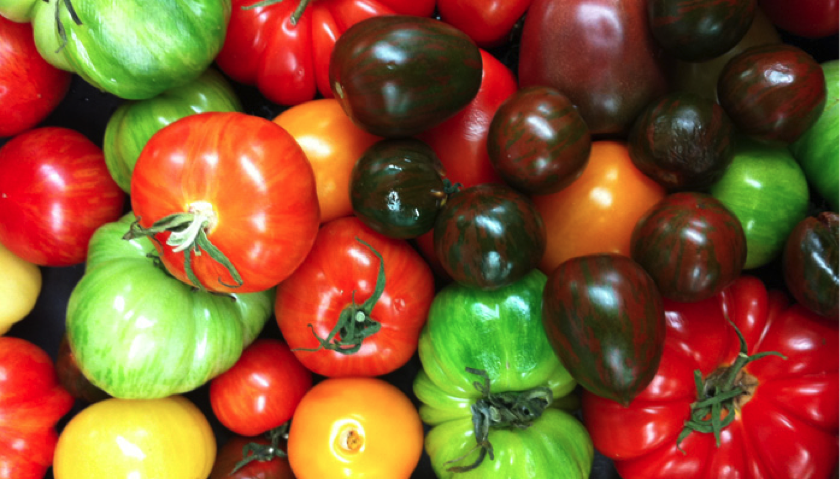 |
uploads/2013/04/tomatoes.jpg) |
In pasta sauces, on sandwiches, on pizzas, and in soups, tomatoes are a staple of cuisines around the world. But did you know that this savory and juicy vegetable is not actually a vegetable? Scientifically known as Solanum lycopersicum, tomatoes are classified as fruits [1]. They are a part of the nightshade family, which also includes potatoes, peppers, and eggplants, as well as other common food plants. Originating from the mountainous Andes of South America, tomatoes have a long history of human cultivation and consumption. After they were introduced to Europe in the 1500's (not long after the Spanish "discovery" of the Americas), tomatoes became a global phenomenon. Today, over 159 million tons of tomatoes are produced worldwide per year [2]. It's hard to imagine what our cuisine would be like without them. Not only are tomatoes colourful and tasty, they are also incredibly good for you. Scientists have found tomatoes to be particularly rich in vitamins (A, C and K, biotin), and a host of bioactive phytonutrients (tomatine, lycopene, pregnane, naringenin chalcone, and fatty acid derivatives) that fight obesity, osteoporosis, cancer, and heart disease. Indeed there is far more in a juicy red tomato than meets the eye!
Vitamins
Vitamins are essential nutrients for homeostasis - the balancing act in that takes place in your body every day to keep you healthy. Vitamins can be found throughout the body, serving as enzyme or protein co-factors to help in blood clotting, vision, and bone health. Tomatoes are a great source of vitamin C, which is crucial in maintaining collagen - a protein found in skin, bones, tendons, ligaments and many other parts of your body. Without vitamin C, you would develop a disease called "scurvy", which is characterized by bleeding gums, spotty skin, jaundice and wounds that don't heal. Vitamin C is a critical cofactor that plays a role in fat and hormone metabolism [3]. Tomatoes are also rich in vitamin A. Vitamin A is important for vision - it is used in the eye's light absorbing protein (called rhodopsin). Children who are short on vitamin A can become blind. Indeed, vitamin A deficiency and childhood blindness is a major problem in the developing world [4]. Blood clotting is also aided by tomatoes, which are high in vitamin K. Vitamin K is also important in bone health and growth [5].
Bottom line: Tomatoes are plentiful in three essential vitamins (A, C and K) that keep your body functioning and healthy.
Biotin
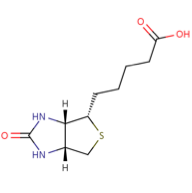 |
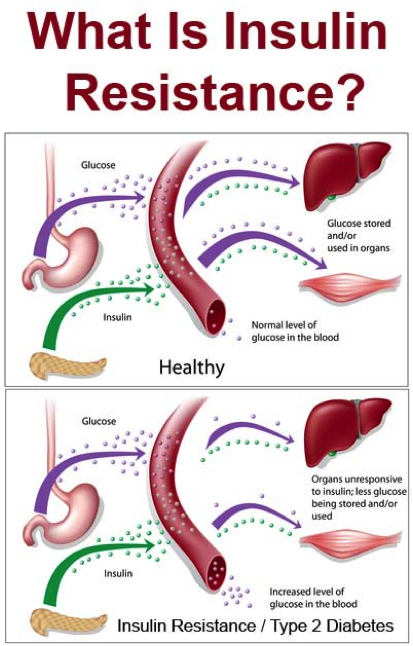 |
and-insulin-resistance/) |
Bottom Line: Tomatoes are a great source of biotin. Biotin is an essential nutrient that can help to prevent type 2 diabetes!
Tomatine
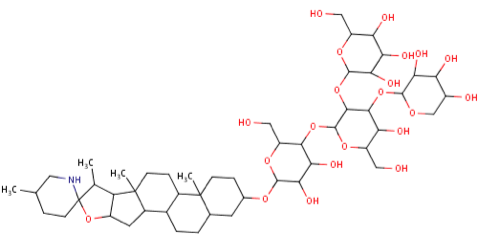 |
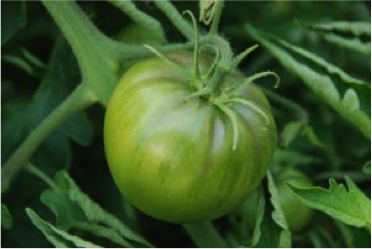 |
08/24/cracked-lazy-tomatoes/) |
More positive health effects of tomatines include their ability to 1) help reduce cholesterol, and 2) boost the immune system to fight against pathogenic bacteria [8]. Cholesterol reduction is achieved when tomatine physically breaks down cholesterol in the cell membrane. One study found that cholesterol and tomatine bonded together pre-digestion and were excreted before absorption by the stomach, thereby reducing circulating cholesterol levels [12]. Other studies have shown that tomatine binds to and inhibits the ACAT enzyme (acyl-CoA-cholesterol acyl-transferase). This enzyme is important for cholesterol synthesis [13]. Tomatine has also been shown to be effective in fighting disease and infection. In one study, tomatine was shown to generate an antigen-specific cellular immunity, which means that there is great future capacity for fighting bacterial pathogens and viruses. Tomatine's ability as an immunostimulator means that it can be used as an effective vaccine adjuvant, inducing a response from T-killer cells (also known as a CTL response), improving the efficacy of vaccines [14].
Bottom Line: The tomatine from tomatoes in its various forms has lots of health benefits, including anti-cancer, cholesterol reduction, and improvement in immunity.
Lycopene
 |
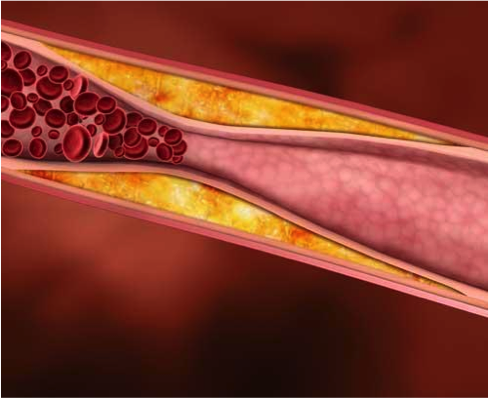 |
control-clinic.html) |
The health benefits of lycopene don't end with cholesterol reduction. Lycopene is also an anti-inflammatory agent that prevents the production of inflammatory cytokines. A recent diet intervention trial [20] involving overweight and obese women showed that tomato juice consumption (1 glass/day) significantly reduced the levels of the inflammatory cytokines interleukin 8 (IL-8) and tumor necrosis factor alpha (TNF-a). These proteins can cause fever, swelling, redness, pain and muscle wasting. They can also exacerbate symptoms associated with obesity and metabolic syndrome. By reducing the levels of these noxious blood proteins, lycopene is able to protect overweight individuals from a state of chronic inflammation. Lycopene not only promotes heart health and cuts down inflammation, it also protects women against osteoporosis. Studies have found that women consuming larger amounts of carotenoids and lycopenes have a significantly reduced risk of hip fractures [21], while women who were on lycopene-restricted diets exhibited significant bone loss [22]. So eat more tomatoes if you want strong bones.
Bottom line: Lycopene makes tomatoes red and is excellent in promoting heart health, lowering cholesterol, reducing inflammation and preventing osteoporosis.
Exotic Phytochemicals
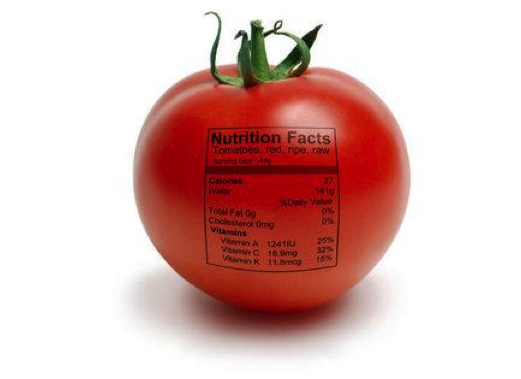 |
Bottom line: A tomato a day can keep the doctor away
References
- Yamamoto K, Guo W, Yoshioka Y, Ninomiya S. On Plant Detection of Intact Tomato Fruits Using Image Analysis and Machine Learning Methods. Sensors (Basel) 2014; 14(7): 12191-206.
- U.S. Department of Agriculture: Economic Research Service. Tomatoes; http://www.ers.usda.gov/.
- Jane Higdon. Vitamin A. http://lpi.oregonstate.edu/infocenter/vitamins/vitaminA/ (accessed 10 July 2014).
- Jane Higdon. Vitamin C. http://lpi.oregonstate.edu/infocenter/vitamins/vitaminC/ (accessed 10 July 2014).
- Jane Higdon. Vitamin K. http://lpi.oregonstate.edu/infocenter/vitamins/vitaminK/ (accessed 10 July 2014).
- Said HM. Biotin: biochemical, physiological and clinical aspects. Subcell Biochem 2012; 56: 1-19.
- Sasaki, Y., Sone, H., Kamiyama, S., Shimizu, M., Shirakawa, H., Kagawa, Y. et al. Administration of biotin prevents the development of insulin resistance in the skeletal muscles of Otsuka Long-Evans Tokushima fatty rats. Food Funct. 2012;3(4):414-419.
- Friedman, M. Anticarcinogenic, cardioprotective, and other health benefits of tomato compounds lycopene, α-tomatine, and tomatidine in pure form and in fresh and processed tomatoes. J Agr Food Chem. 2013;61(40):9534-9550.
- Shieh, J. M., Cheng, T. H., Shi, M. D., Wu, P. F., Chen, Y., Ko, S. C., et al. α-Tomatine suppresses invasion and migration of human non-small cell lung cancer NCI-H460 cells through inactivating FAK/PI3K/Akt signaling pathway and reducing binding activity of NF-κB. Cell Biochem Biophys. 2011;60(3):297−310.
- Shih, Y. W., Shieh, J. M., Wu, P. F., Lee, Y. C., Chen, Y. Z., Chiang, T. A. α-Tomatine inactivates PI3K/Akt and ERK signaling pathways in human lung adenocarcinoma A549 cells: effect on metastasis. Food Chem Toxicol. 2009;47(8):1985−1995.
- Lee, S. T., Wong, P. F., Cheah, S. C., & Mustafa, M. R. Alpha-tomatine induces apoptosis and inhibits nuclear factor-kappa B activation on human prostatic adenocarcinoma PC-3 cells. PLoS One. 2011;6(4), e18915.
- Shao, D., Bartley, G. E., Yokoyama, W., Pan, Z., Zhang, H., Zhang, A. Plasma and hepatic cholesterol-lowering effects of tomato pomace, tomato seed oil and defatted tomato seed in hamsters fed with high-fat diets. Food Chem. 2013;139(1):589−596.
- Fujiwara, Y., Kiyota, N., Tsurushima, K., Yoshitomi, M., Horlad, H., Ikeda, T., et al. Tomatidine, a tomato sapogenol, ameliorates hyperlipidemia and atherosclerosis in ApoE-deficient mice by inhibiting acyl-CoA:cholesterol acyl-trans-ferase (ACAT). J Agric Food Chem. 2012;60(10): 2472−2479.
- Morrow, W. J. W., Yang, Y. W., & Sheikh, N. A. Immunobiology of the tomatine adjuvant. Vaccine. 2004;22(19):2380-2384.
- Shi, J., Kakuda, Y., & Yeung, D. Antioxidative properties of lycopene and other carotenoids from tomatoes: synergistic effects. Biofactors. 2004;21(1):203-210.
- Silaste M-L, Alfthan G, Aro A, Kesäniemi YA, Hörkkö S. Tomato juice decreases LDL cholesterol levels and increases LDL resistance to oxidation. Brit J Nutr. 2007;98(6):1251–1258.
- Palozza P, Catalano A, Simone RE, Mele MC, Cittadini A. Effect of lycopene and tomato products on cholesterol metabolism. Ann Nutr Metab. 2012;61(2):126-34. Review.
- Ried, K., & Fakler, P. Protective effect of lycopene on serum cholesterol and blood pressure: Meta-analyses of intervention trials. Maturitas. 2011;68(4):299-310.
- Shidfar F., Froghifar N., Vafa M., Rajab A., Hosseini S., Shidfar S et al. The effects of tomato consumption on serum glucose, apolipoprotein B, apolipoprotein A-I, homocysteine and blood pressure in type 2 diabetic patients. Int J Food Sci Nutr. 2011; 62(3):289-294.
- Ghavipour M, Saedisomeolia A, Djalali M, Sotoudeh G, Eshraghyan MR, Moghadam AM, Wood LG. Tomato juice consumption reduces systemic inflammation in overweight and obese females. Br J Nutr. 2013 Jun;109(11):2031-5.
- Sahni S1, Hannan MT, Blumberg J, Cupples LA, Kiel DP, Tucker KL. Protective effect of total carotenoid and lycopene intake on the risk of hip fracture: a 17-year follow-up from the Framingham Osteoporosis Study. J Bone Miner Res. 2009 Jun;24(6):1086-94. doi: 10.1359/jbmr.090102.
- Mackinnon ES, Rao AV, Rao LG. Dietary restriction of lycopene for a period of one month resulted in significantly increased biomarkers of oxidative stress and bone resorption in postmenopausal women. J Nutr Health Aging. 2011 Feb;15(2):133-8.
- Manabe H, Murakami Y, El-Aasr M, Ikeda T, Fujiwara Y, Ono M, Nohara T. Content variations of the tomato saponin esculeoside A in various processed tomatoes. J Nat Med. 2011 Jan;65(1):176-9.
- Yamamoto T, Yoshimura M, Yamguchi F, Kouchi T, Tsuji R, Saito M, et al.. Anti-allergic activity of naringenin chalcone from a tomato skin extract. Biosci Biotechnol Biochem 2004; 66(8): 1706-11.
- Kota BP, Huang TH, Roufogalis BD. An overview of biological mechanisms of PPARs. Pharmacol Res. 2005 Feb;51(2):85-94.
- Kim YI, Hirai S, Goto T, Ohyane C, Takahashi H, Tsugane T, et al.. Potent PPARα activator derived from tomato juice, 13-oxo-9,11-octadecadienoic acid, decreases plasma and hepatic triglyceride in obese diabetic mice. PloS One. 2012;7(2):e31317
- Jia Y, Kim JY, Jun HJ, Kim SJ, Lee JH, Hoang MH, et al.. The natural carotenoid astaxanthin, a PRAR-α agonist and PRAR-γ antagonist, reduces hepatic lipid accumulation by rewiring the transcriptome in lipid-loaded hepatocytes. Mol Nutr Food Res. 2012 Jun;56(6):878-88